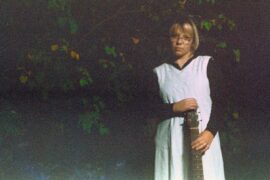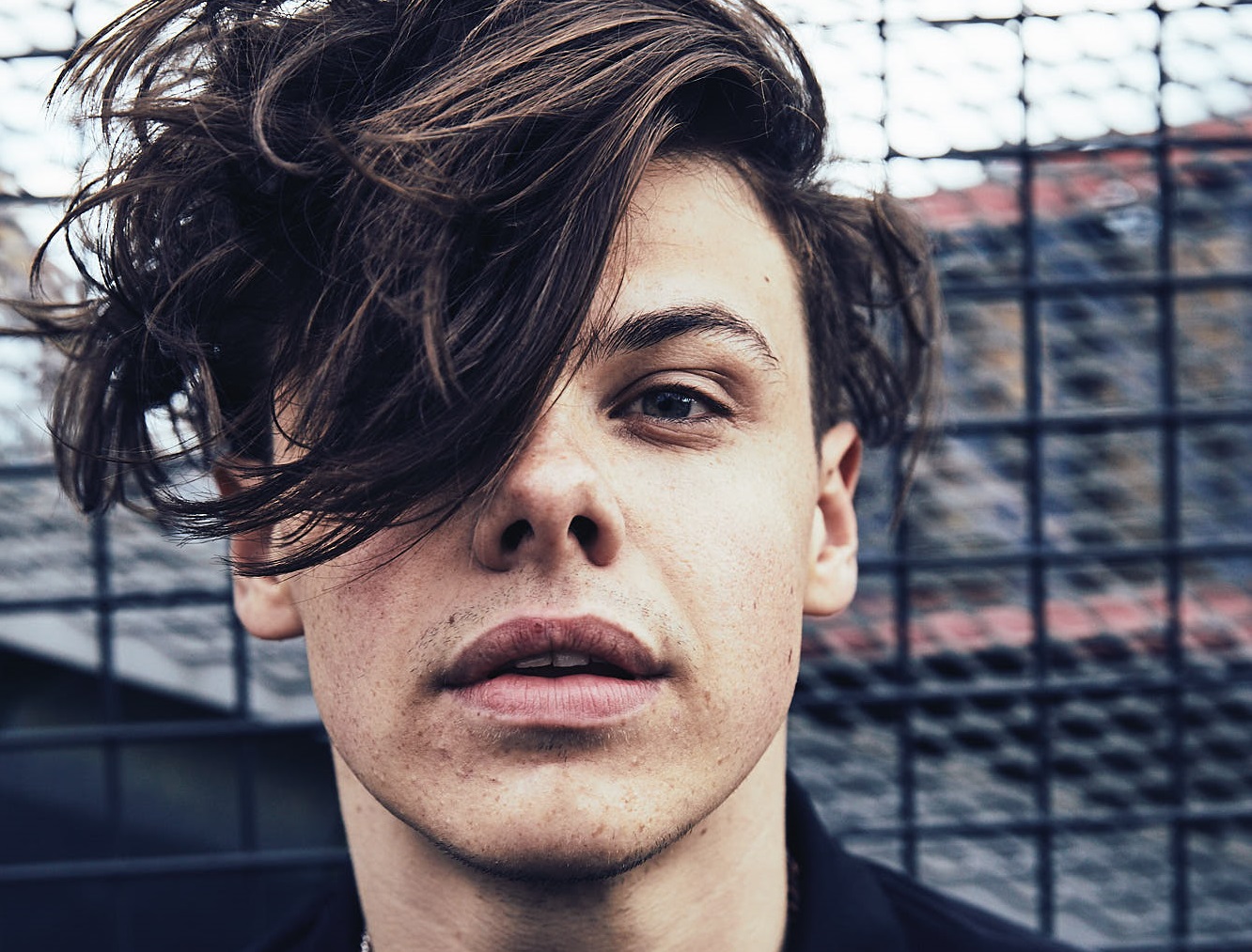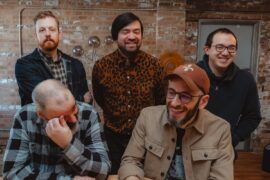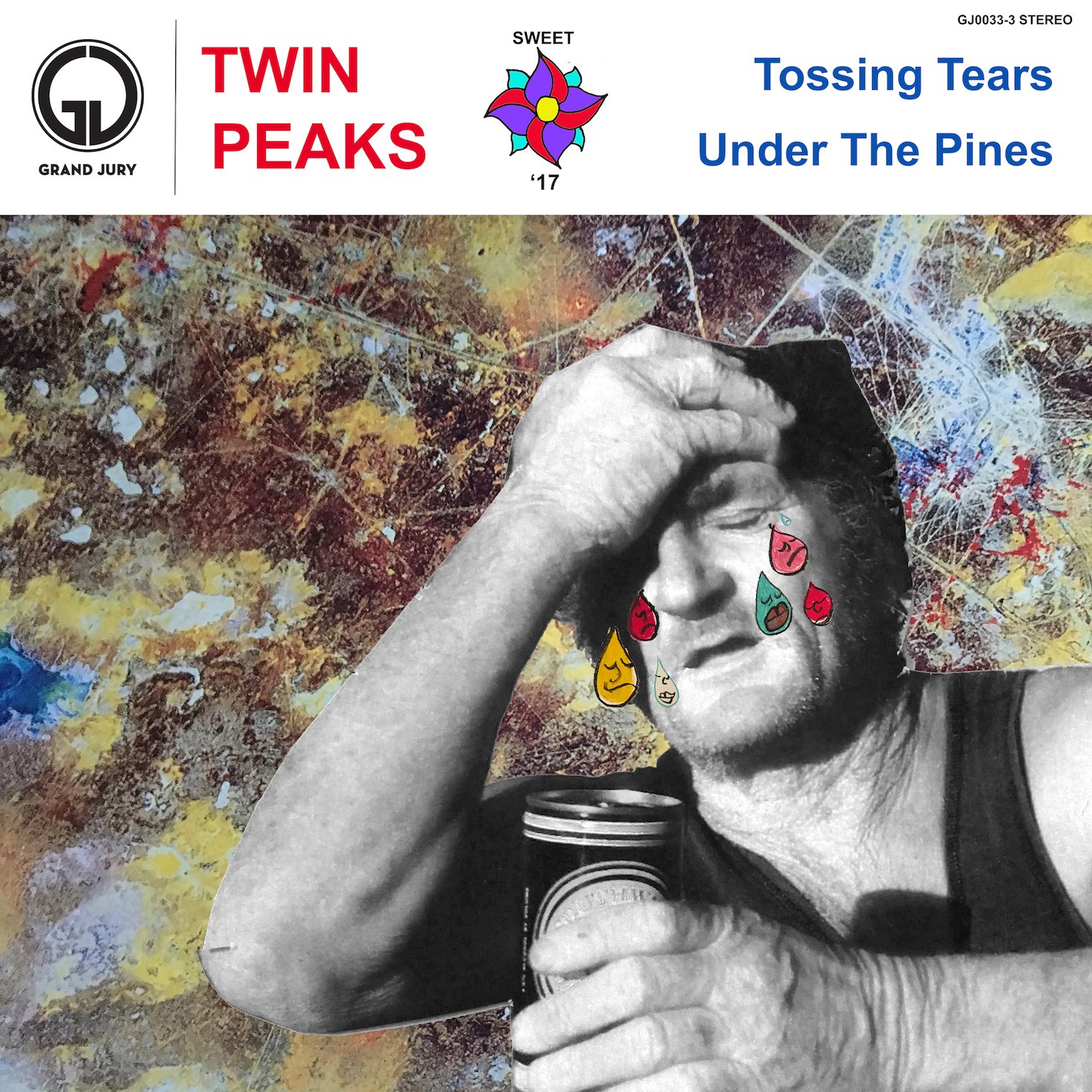Fresh off the release of their cinematic sophomore LP ‘Lost in Translation,’ indie pop band Valley talk to Atwood Magazine about curating an album experience, the benefits of band therapy, how they’re protecting their energy, and why more artists need to talk about The 1975.
‘songs that got lost in translation’ – Valley
I remember Matty Healy saying an album intro is like turning on a video game…. it feels like you’re entering a world, and that’s always stuck with me.
Valley’s sophomore album feels the soundtrack to a movie that we haven’t seen yet.
Intimate and expansive, achingly emotive and all-consuming, Lost in Translation is a cinematic world unto itself – one whose highs and lows mirror our lived experiences; one where we struggle to connect with others and understand ourselves; one where we’re flawed but striving to do better all the time, and everyone’s just trying to get by one day to the next.
“I bought a book on anxiety; it’s much cheaper than therapy,” lead singer Rob Laska sings melodramatically on the album’s scene-setting title track. “You can dig for my thoughts in a pile of clothes.” It’s a cheeky line, to be sure, and one that underscores the band’s approach to their latest batch of songs: Unfiltered and unflinchingly honest, Lost in Translation isn’t the theme to any old movie; rather, Valley’s passionate, deeply confessional second record is the sonically and emotionally charged score to our own perfectly imperfect lives.
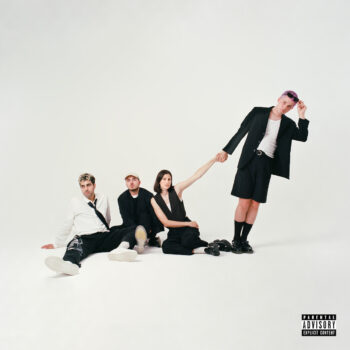
Sometimes I wish I never changed
As I try to leave and hit the ceiling
My loneliness is hard to fake
And there’s no song to fight the feeling
I admit maybe I’m better alone
But the darkness comes and I can’t outrun
Symptoms of the pressure pushing on my name
Sometimes I really wish I never did change
– “Lost in Translation,” Valley
Originally released June 23, 2023, Lost in Translation is a breathtakingly beautifully – and equally heartrending – display of musical talent and raw humanity from Toronto indie pop band Valley. The four-piece of vocalist Rob Laska, guitarist Mickey Brandolino, bassist Alex Dimauro, and drummer Karah James dive into life’s wondrous and unforgiving depths – the great, the good, the fine, and the ugly – on fifteen painstakingly crafted tracks that, experienced together as one, bring listeners on an endlessly exhilarating journey of self-discovery and self-doubt, candid introspection and inner reckoning.
“I think this album is very much a reflection of what it’s like to be in a band,” Rob Laska tells Atwood Magazine. “It’s about bandhood, it’s about loss, it’s about heartbreak, it’s about real life shit that we’ve been going through, as simply as that… It’s about figuring out how to be a band, how do you sustain being a band, how to be good people, how to process things, how to not process things. It’s just the whole human experience that we can present to people from being 24 to 26. A lot happened and changed throughout making this album, which we’re really grateful for, because at the end of the day, the change is the growth.”
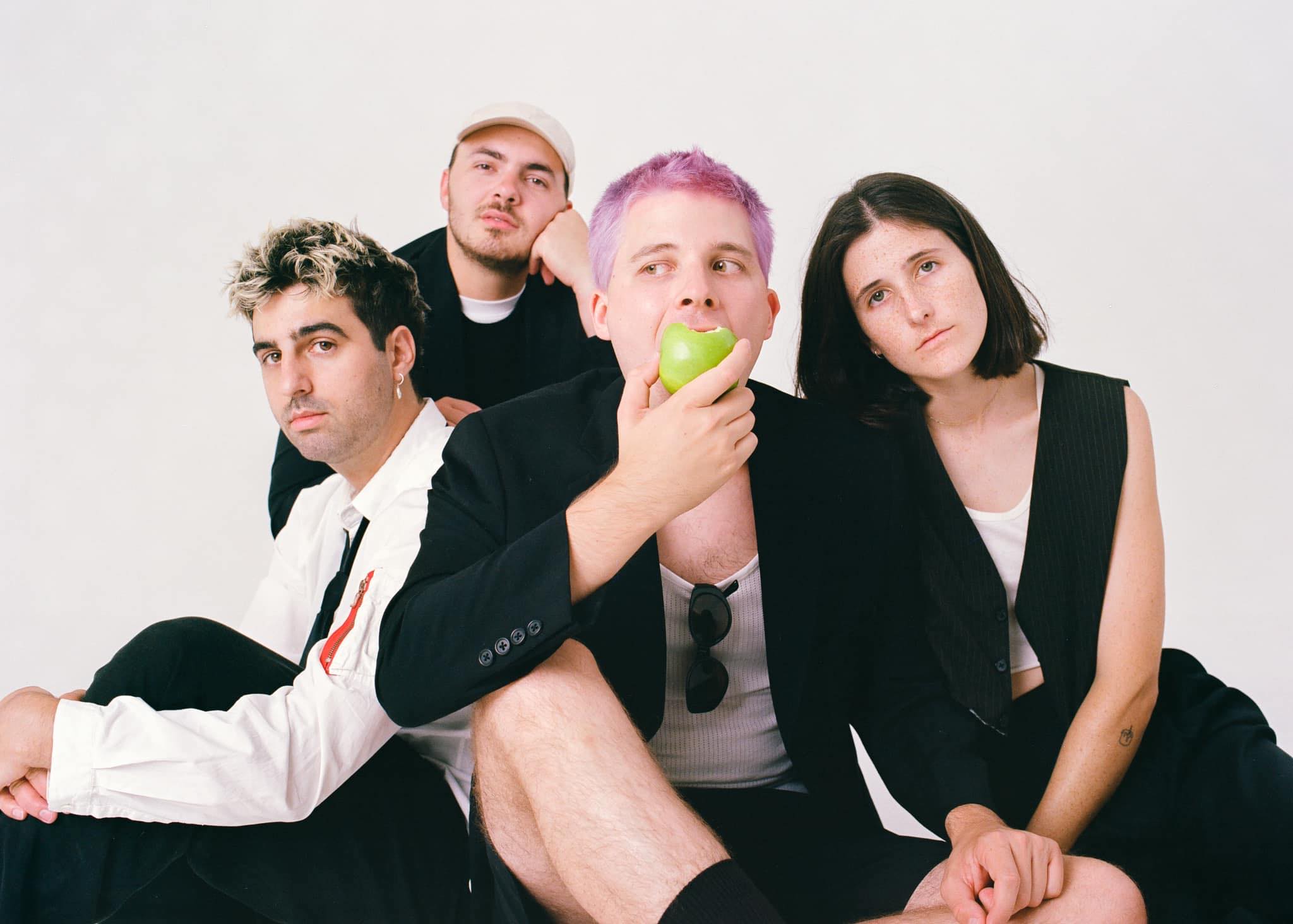
The title came from band therapy one day, ’cause that’s something we did for quite a while and still do as a band, just to keep our heads in the right place and stick together.
Comprised of sweet, soaring synth-laced anthems, energizing, heavily effected hyperpop eruptions, brooding and bittersweet acoustic ballads, untouched voice notes, euphoric electric guitar-fueled jams, and more, Lost in Translation is as endlessly catchy as it is cathartic: Every song feels torn from the band’s collective diary, their lyrics magnifying snapshots from their own lives that depict what many of us are dealing with: The struggle to fit in, to belong, to know your place in the world and amongst others.
“It poses more questions than answers, which has been an accurate description of our lives since releasing our first album,” Laska reflects. “It’s been a maze to figure out what this all means, why we still do it, what’s been found and most importantly, what’s been lost along the way.”
“I think we grew up thinking that bands need to be dramatic and complex and f’ed up half the time. Like, you grow up looking at Green Day and Fleetwood Mac and all these bands that have had issues… There’s just so much going on, and you think your band needs to be complicated. And then you realize, no, actually, we need to be so sane and on the same page and have really good chemistry together to sustain this… Everyone’s dealing with a four-way marriage, so it’s just a lot of things getting lost in translation, and then kind of coming back together.”
You grow so much making an album. You’re gonna hate one thing one day and love it the next day. It’s just how it goes.
Whereas Valley’s critically acclaimed debut album MAYBE, released in 2019, was a collection of songs capturing their formative years – Laska likens it to a “college daydream haze, post-high school” – Lost in Translation arrives in the wake of two carefully curated EPs (2020’s sucks to see you doing better and 2021’s Last Birthday) and years of relentless touring, all of which informed the Canadian band’s approach to their new album.
“We think about the live show a lot when we’re in the studio more and more,” guitarist Mickey Brandolino says, explaining how they designed songs to capture and create special moments on the stage. “Like the breakdown in ‘Break for You’ where the drums come out, everything really comes out except for the guitars and Rob’s screaming, like this huge yell, and it gets way more epic somehow. We knew that because live, it’s gonna be this huge release when fans have a moment to scream and then can come back into the last chorus, and someone’s gonna jump off something. We think about that moment in the studio now that we’ve toured so much. Like, ‘This is a live moment, this is the lyric that everyone’s gonna scream in the crowd.’ Adjusting a lyric to be more scream-able as an audience member, like to feel that connection. I think musically, we’ve definitely just become more attuned to that.”
Perhaps it’s that intuitive design that helps make Lost in Translation such a rollercoaster ride from start to finish.
Valley recently released a deluxe version of their sophomore album – aptly-titled songs that got lost in translation – adding seven new demo tracks that didn’t make the initial cut, but “deserve to be shared,” per the band.
There’s a lot to love about Valley’s down-to-earth attitude, their uncompromising lyrical vulnerability, and their bold, ever-evolving indie pop sound. Atwood Magazine caught up with band members Rob Laska, Alex Dimauro, and Mickey Brandolino to discuss the highs and lows of making Lost in Translation, the benefits of band therapy, how Valley protect their energy, and why more artists need to talk about The 1975.
“There’s a lot of bands that wouldn’t exist without them. So many people I know got into music because of that first album,” Brandolino asserts. “It’s old enough now to reference and be like, man, that was a big part of another life that I lived.”
Read our unabridged interview below to get up-close and personal with Toronto’s hottest pop band – one devoted to evoking the magic, the fragility, and the fullness of our perfectly imperfect lives.
— —
:: stream/purchase songs that got lost in translation here ::
:: connect with Valley here ::
‘songs that got lost in translation’ – Valley
A CONVERSATION WITH VALLEY
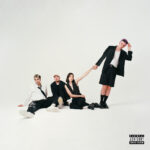
Atwood Magazine: Valley, your new album Lost in Translation is just a few months old as of today. What's it been like to have this album out in the world?
Rob Laska: I feel like it’s just starting to process for us. I actually caught up with our A&R yesterday over lunch, and he told me a funny way of putting out albums, because I feel like everyone’s experiencing it for the first time. To the public, people are feeling like the first time we created it – the high and the energy and the wavy ride when we first knew we had it in our hands. And then what people don’t see is us spending months and months prepping the release of it, and the promo and the marketing and engineering the rest of the vision other than making the music. I think that’s what causes a lot of artists, when they first put out an album, the first two months, you enter this deflation zone where you’ve ballooned so much that the impact of it being out deflates you a little bit, because there’s just so much weight behind putting it out.
And I feel like now we’re slowly inflating again, because the world has received it and now we’re getting that feedback again. So it’s that constant loop of the exhaustion of making an album, but also the beauty of it. I think we’re now entering the phase of like, oh, it’s existed for a while in the world and people can now carry it… Or like, it has its own legs to stand on. We’re excited to see how it’s impacting people! We also just got off the craziest tour of our lives – we played sold-out shows across Australia and Asia, and I think that also made us realize that the album is affecting people and it’s doing the thing it’s supposed to do. So in short, it’s awesome! [laughs]
Was that your first time tour there?
Rob Laska: First time doing a full Asia, Australia tour, yeah. We went to Seoul once for a festival, but that was nothing compared to what we just experienced in the sense of our own shows, our own venues. The fact that we could step foot in Tokyo and sell out a 2000-cap venue and we’ve never been there before, is kind of crazy. It doesn’t make sense.
Alex Dimauro: Yeah. It was insane. It was very special to hear the songs sang back to us in so many different countries around the world at this point.
Rob Laska: We’re very, very honored right now with the album just existing.
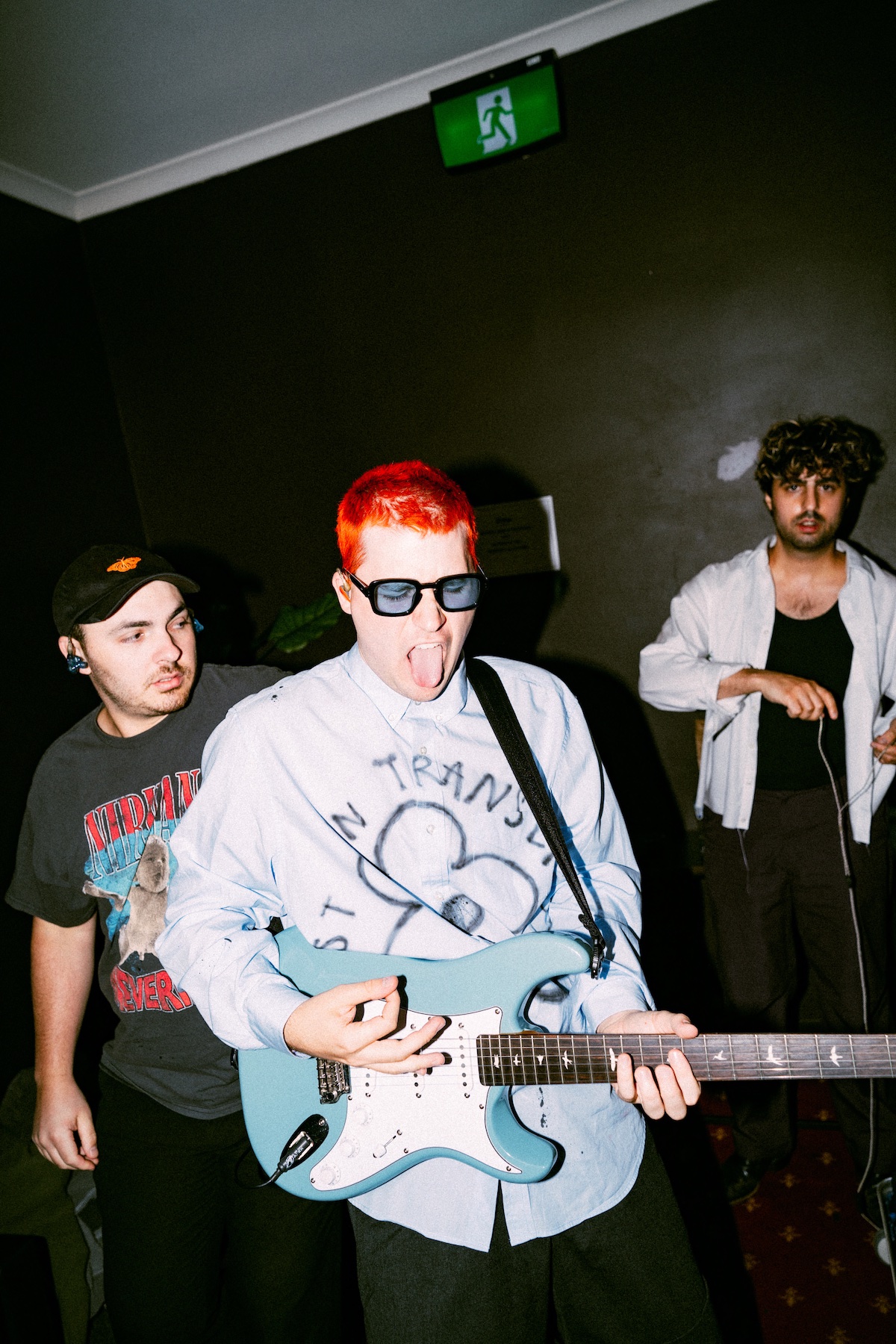
I can only imagine. This record obviously comes several years after MAYBE's release, and several tours later. You haven't been quiet in the ensuing years, releasing Sucks to See You Doing Better and two different versions of the Last Birthday EP. But does it feel different when you've curated a full-length album, compared to those EPs?
Rob Laska: Yes, but not in an obvious way. I think I recently discovered a way of also comparing it, where it’s like… EPs, I used to say, are less pressure, but they’re still pressure. They sometimes feel like buying time for an album. But to be truthful, I think EPs are like spring training for the season. That’s what I see EPs now. And they were essentially us going to spring training, because we weren’t ready for the season yet. That’s what it kind of felt like. And also, there was a pandemic. But those two EPs, I think, needed to be made, especially post MAYBE because I think there was a little bit of like, second albums are scary and we don’t know how to approach it, because we had our whole life to write MAYBE and we have now a constructed amount of time to make Lost in Translation.
And also, I just think we weren’t ready. We wanted to really see how far down different lanes we go. And I thinks, Sucks and Last Birthday were the most beautiful, exploratory times. And I don’t think Lost in Translation would be possible without those EPs. But it did take a minute. But I think it’s important and I think we had to take our time to, A, be fulfilled with the whole process of it. I don’t know if we personally as artists and producers and writers would be as fulfilled if we didn’t do it the way we did it, if we just kind of kept up with the momentum, post-MAYBE. I think we needed that breath and just build everything on our own pace. And it seemed to work, so we’re lucky that way, I guess.
With songs like “Nevermind,” “Hiccup,” “1999,” and “Society,” those EPs are masterful in their own right. Quite frankly, some of the tracks on Sucks to See You Doing Better are some of my favorite songs of yours.
Alex Dimauro: Thank you. Yeah, I think we wanted to treat those EPs with the same sort of, like you said, masterful intent as we would an album, because we’re not really ones to just throw a bunch of songs together and release it. Something about our artistry, I don’t know what it is, but we’re really obsessed with the way it all flows, what the meaning from song to song is. Why did these songs get paired together? Just creating that experience for people. So I’m glad that you noticed it and say that, ’cause we still wanted it to feel emotionally like a record, without the weight of it. [laughs]
Can you tell me a little bit about the story behind this new album? What is the meat and potatoes connecting these songs together?
Rob Laska: Yeah, so much. I think for starters, I feel like the album at the beginning of the process didn’t really necessarily have a North Star or a particular logic or meaning. I think all albums start like that. I think even the greatest artists in the world, when they go in for an album, it’s just like they’re staring at a blank page like anyone is, which makes us realize that it’s just a lot simpler than that. But I think starting to write these songs, I think there’s, again, a process of getting a lot of clutter out. So we wrote a lot of songs, there’s probably like 80 songs total, and ideas. And then as we started making the album, I think we were going through a lot of changes. Like I said, we made MAYBE in a college daydream haze, post-high school.
And then, the EPs kind of happened during this weird pause on the world time. And that was a lot of growth. There’s like seven or eight years of growing that turned into this album, and it’s also seven to eight years knowing each other and being a band, front-facing wise. So there’s just a lot of change and growth, and I think this album is very much a reflection of what it’s like to be in a band.
It’s about bandhood, it’s about loss, it’s about heartbreak, it’s about real life shit that we’ve been going through, as simply as that. I wish we had a more cool or crazy answer, but it’s really just about bandhood. It’s about figuring out how to be a band, how do you sustain being a band, how to be good people, how to process things, how to not process things. It’s just the whole human experience that we can present to people from being 24 to 26. A lot happened and changed throughout making this album, which we’re really grateful for, because at the end of the day, the change is the growth. The title came from band therapy one day, ’cause that’s something we did for quite a while and still do as a band, just to keep our heads in the right place and stick together.
I think we grew up thinking that bands need to be dramatic and complex and f’ed up half the time. Like, you grow up looking at Green Day and Fleetwood Mac and all these bands that have had issues… There’s just so much going on, and you think your band needs to be complicated. And then you realize, no, actually, we need to be so sane and on the same page and have really good chemistry together to sustain this. Because we’re always talking about sustainability as a band. As a solo artist, it’s really easy to sustain, because it’s you and yourself. But this is me and three other people. Everyone’s dealing with a four-way marriage, so it’s just a lot of things getting lost in translation, and then kind of coming back together. That’s kind of the whole record.
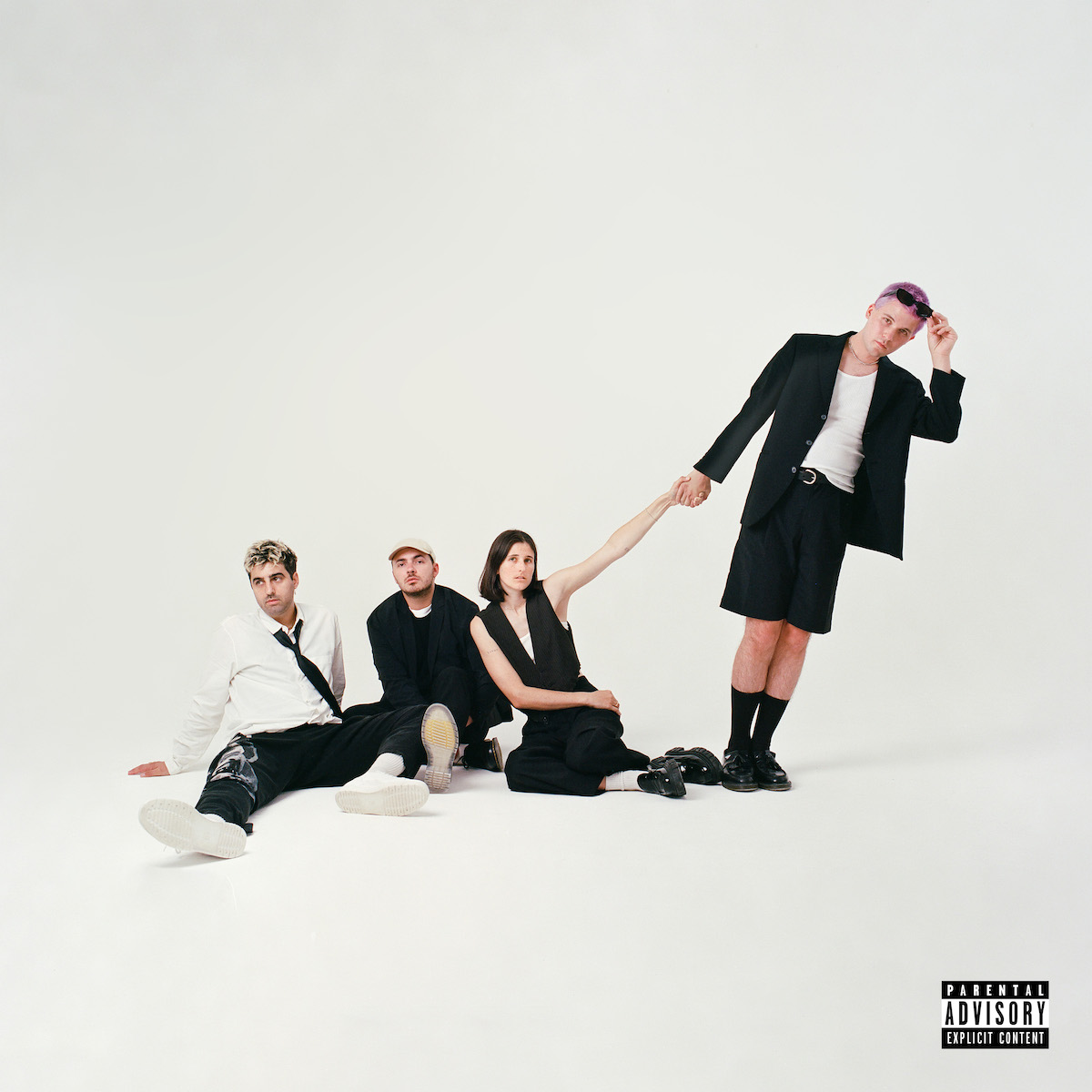
I love hearing that you’ve done band therapy. Do you mind sharing a little bit about your experiences there, and how therapy has helped?
Rob Laska: Yeah! We’ve worked on band therapy with a numerous amount of amazing therapists, depending where we are in the world and where we’re traveling. And there’s so many factors. So everyone we worked with… It’s an incredible experience. Half the time, you want to go in because you try to avoid issues. That’s the classic thing with therapy. It’s like, go before there’s a problem. So hopefully, there’s not a problem, but there’s always going to be problems. But in our case, going into therapy was a part of keeping chemistry together, kind of like Chris Martin always says. It’s just like, if you don’t have the chemistry, there’s no Coldplay. It’s kind of the same thing with us. If the chemistry is not there, if we’re not aligned on just a pure value and fulfillment way, then we can’t make great music. That’s just ’cause they go so hand in hand.
So a lot of the therapy work has been unraveling past trauma and things that… It’s things like, that one thing you said to me seven years ago still piss me off, and I can’t get over it, and it’s blocking a creativity portal for us. I can’t almost be one with you in a room when we’re making something, ’cause that thing still bothers me. It’s like digging that deep under the iceberg. And from there, we do a lot of group work in terms of our childhood, and we talk to each other about our past and things that maybe people don’t know about us, or things that we have felt that we couldn’t say in not an enclosed space for us to feel safe to say it.
It’s just a lot of that kind of work. And the goal with band therapy is to eventually, hopefully not go. We’ll always do personal therapy, but we don’t always want to be sitting in a room and going through our shit. We’re hopefully learning the tools to then really be able to do it on our own. ‘Cause it’s really just about being honest and having really good conversations as business owners, as creators, as artists, whatever it is. It just comes down to being able to talk to each other. You’re literally paying to learn how to talk to each other, and empathize. That’s really essentially band therapy for us.
You're creating that space where you can talk about things that you're not just going to blurt out over coffee or drinks or dinner…
Rob Laska: Yeah. With our lives, there’s never the time anymore. It’s like, what? I’m gonna say it at the airport when we’ve got two hours of sleep? Sometimes, you need that space.
That's absolutely lovely to hear. I'm so glad that y'all have benefited from that. Valley as an engine has really taken off over the past... Half decade? It's not been that long... and to think about what's been going on during time...
Rob Laska: Yeah. It’s been, I think, like five years, four years. Five years.
Alex Dimauro: I’d say like definitely a half decade of sustained growth, and I guess success on a scale, I guess, yeah.
Rob Laska: I’m glad the world thinks that, ’cause it’s always hard to remember that we’ve known each other for so long, but the world has only known us for five years, which I’m like, I’ll take it. That’s awesome. In my head, I’m like, I’ve known these guys for like 15 years now or something. It’s nuts…
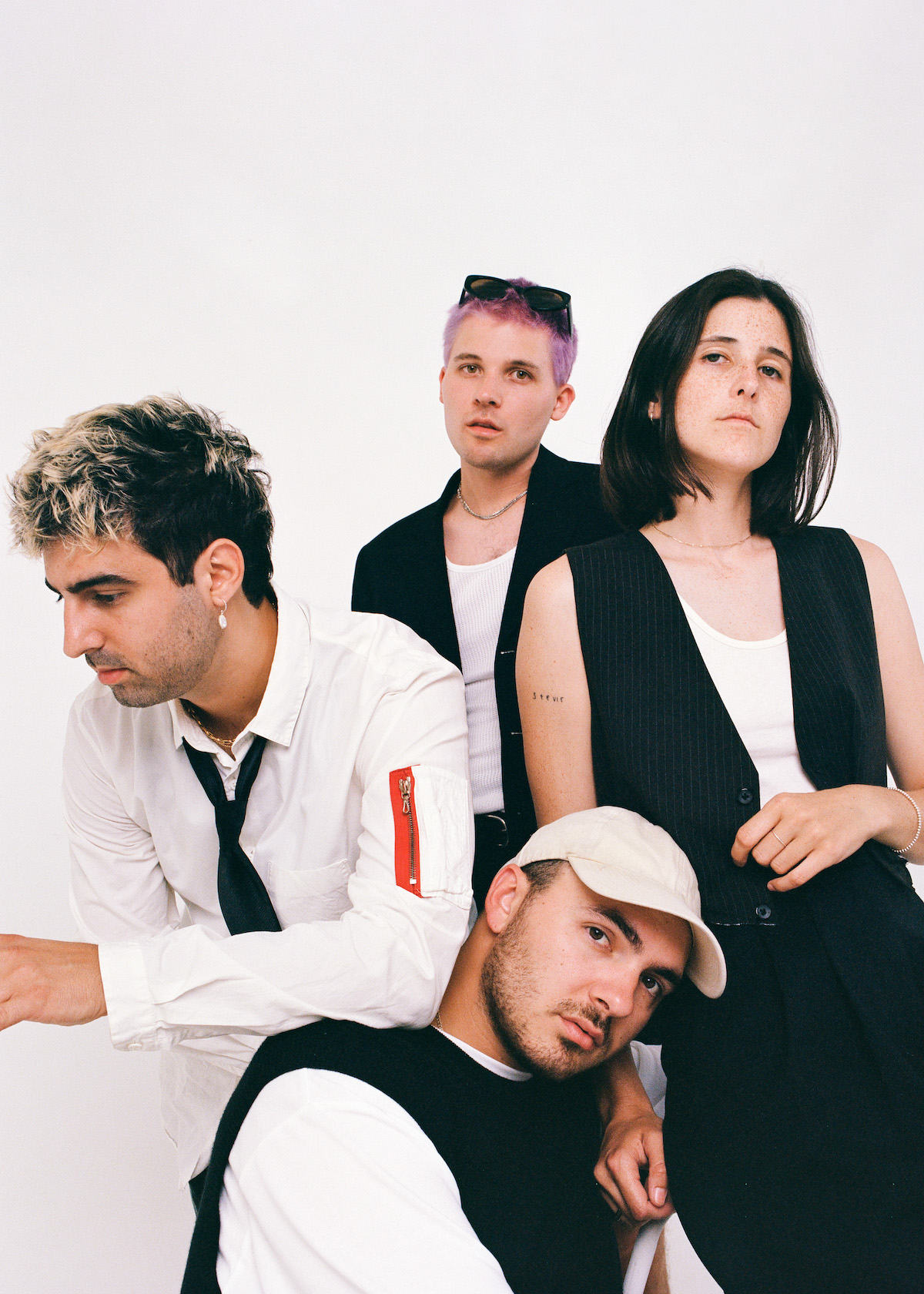
Diving in now, Lost in Translation shocked me from the start. You begin with this beautiful instrumental piece, and then go right into the title track. Together, they set the stage for what I felt to be a truly cinematic experience. It feels like the soundtrack to a movie that I haven't seen… All the songs really feel like they flow together and exist in the same world. Can you tell me about the opening two songs, and why you chose to kick off the album this way?
Rob Laska: We just love albums like that. We grew up on album experiences ’cause we’re so in the middle generation where we still remember putting a CD in the car and listening to an album top to bottom while driving around. We’re still on that cusp, and that’s the cool thing about our generation. I, at one point, had an iPhone in my pocket, but I still drove a car that could play a CD, you know what I mean? And listen to a CD from top to bottom, which I think is such a blessing ’cause we had both those experiences, so we could have that experience of opening a CD, and having a top to bottom movie moment in a car. So we just grew up with that.
Alex Dimauro: We’re also the generation that brought vinyl back too…
Rob Laska: Yeah, we did bring vinyl back. Let’s go!
You listen to MAYBE and it feels like it was cut from the same cloth, in the sense that we’ve always wanted that experience. I think it just comes down to something I heard a long time ago. Out of all people, I remember Matty Healy saying an album intro is like turning on a video game. You know, when you’re a kid and you turn on PlayStation and the PlayStation logo appears, it feels like you’re entering a world.
And that’s always stuck with me. You want people to get prepared for what they’re about to listen to, or play, or experience. So I always see it as a video game intro or something. I love how he said that. Every album I loved growing up had that, it kind of eases you in, and then you feel really comfortable in the house, versus just confused why you’re there. That’s always been a thing we obsessed over.
And I know Alex is super into the sequencing and the stitching. Alex will literally drive around eight hours a week in the car, just moving around sequences and being like, “No, I think this one’s better here. No, this one’s better here. No, wait, this has to go into this.” And he’ll get very micro about that stuff, as we all do. It’s just –
Alex Dimauro: Important.
Rob Laska: We’re obsessed with that experience.
But all these songs, similar to your first record, feel like they're just part of a cinema. It's part of an experience. How did you choose the sequence?
Mickey Brandolino: For our records, I feel like there’s an initial intuitive order where you’ll get to the end of one song and you’ll be like, yeah. Emotionally, just the split-second thought is, “I want to hear this song now… I need something upbeat now because this song was this way,” or whatever. So we write out an initial list. Everyone writes out an initial list, and it matches within the band by like 70%, let’s say. And then we go through it and we’re like, actually, this song is in the same key as this song, and it fades out this way, so it could be really sick if it fades in this way. And the narrative of this song is really cool beside this song because it sort of tells a long story between the two, three songs in a row.
So there’s different sections that create themselves because of your deep psyche… It kind of writes itself, in a greater spiritual sense. I feel like your subconscious does all the work; you just need to listen to it.
Earlier you mentioned The 1975’s Matty Healy – your talking about intros reminded me of The 1975 always having an eponymous opening track on every album, and how that first song always sets the scene.
Mickey Brandolino: Oh, dude. Yeah. It changed so many bands’ lives. There’s a lot of bands that wouldn’t exist without them. I think also bands and artists need to talk about them more. I think there’s this weird vibe of, oh, everyone just assumes. But it’s like, so many people I know got into music because of that album, and it’s now old enough – it’s over 10 years old, I think the first album – it’s old enough to reference and be like, man, that was a big part of another life that I lived.
They were one of my first interviews for Atwood.
Mickey Brandolino: Wow. That’s crazy. I probably read that interview, because at that point, we were still getting over girls and listening to that album. It was the heartbreak summer album.
Rob Laska: It’s true, it’s true.
Back to your music – the first song that you put out for this record was its third track. Tell me a little bit about why you made “Throwback Tears” the first tease off the album.
Rob Laska: Oh, the song was just fun. It was one of those, like, came-together-very-quickly songs. And we just thought it was… Truthfully, we just thought it was a funny way to open up the era, ’cause it wasn’t necessarily foreshadowing what the album is going to be like, but it just kind of felt like this aha moment that people experience first. It’s like a welcome back.
Mickey Brandolino: Like, welcome to not knowing what’s going to happen. You know what I mean? The first lyric is, “I’m on some new shit now.” It was January, I think, when we released it, and we were like, “Listen, Valley’s back.”
Rob Laska: And it was not too long. It’s a very short song, intentionally. ‘Cause we were like, let’s give people just under two minutes, as like a little, “We’re back, but we’re not getting a lot of ice yet.” I don’t know. It just felt right at the time.
You cover a lot of sonic ground on this album, from some more intimate moments like “I Thought I Could Fly” to “We Don't Need Malibu,” to massive, massive songs like “Lost in Translation” and even “Fishbowl.” Tell me about the sonic spread and the vision that you had in mind in terms of this album.
Rob Laska: Yeah. I had this conversation with my partner the other night, ’cause she was kind of going off, being like, “Oh, this album’s so good, but I can’t imagine what you guys are going to do next. I don’t know. I feel like you guys have done… You guys have explored so many avenue, I’m like, what is next?” And I kind of just told her, I’m like, “I truthfully believe there’s never a next for us, because it’s such a culmination of everything we’re into in the moment and at the time.” ‘Cause yeah, I’ve heard it all with this album. I’ve heard it like, “Oh man, they’re really in their pop era.” And I’m like, “Pop era?” I’m like, “We’re just writing songs!”
These are the songs that got us excited this year. And it’s like some people are like, “Oh man, this album feels more like MAYBE than MAYBE is.” And I’m like, “Sick, that’s great.” It’s just like there’s so much always that’s going to just blend for us. And with this album, I keep saying we were just obsessed. We were just as obsessed with Bieber as we were with Fleetwood Mac, as we were with… It was a combination of everything that we’ve consumed the past two years and I went, “Man, I want to make a song that feels like that song. I want to make a song that makes me feel the same way when I listen to this song.” And that’s kind of just what this album ended up being. So we never went into it being like, “Sonically and musically, this is what it has to be.”
We’re such one-track mind when we’re creating, and I think it’s to a beauty. I used to think it’s a fault, but it’s like, we’re just really focused on the song that we’re making that day, and then we make it and we say, “Oh. That makes us feel good. Great. Next song.” And then it’s never like, “Oh. But how is “Break For You” gonna go with “Evenings & Weekends?” ‘Cause to us, it’s totally different vibes. But I don’t know, it’s our vocals and it’s our production and it’s our watermark on everything, so it’s just always gonna be what we’re doing or into at the time. So I keep saying, the next album, we treat it the same way we did this. It’s like, what are we into right now? Oh, we really want to make just guitar and vocal folk music for a few months. Let’s do it.
We’ll probably get a song out of that, and then we’ll do this and then we’ll probably get into Limp Bizkit at one point on this trip and do something. You know what I mean? It’s just always going to gonna be a pot of just throwing shit in it and seeing what happens. So with this album, no direction musically or anything. It’s just kind like, what do we wanna make, what do we wanna say production-wise? And that was just, again, an outcome of what we were into at the time. Just exploring good songwriting, I think. I think this album truthfully is our best songwriting foot forward. I don’t think we’re trying to impress people with a snare sound or a synth sound. We’ve done that. We’ve done so much cool production, and it’s always gonna be awesome, but we’ve realized… Like, I’ve never had someone go up to me, ever. Maybe some producers, ’cause we get nerdy like that. But I’ve never had someone go up to me and be like, “Yo, the synth sound is insane.” No. It’s always, “Oh, that lyric. I needed that lyric ’cause I was on my literal last straw.” So I think that’s maybe the direction musically we wanted to go with, is like, let’s not worry about impressing people with our production skills or what we’re trying to convey musically. It’s like, what are we trying to say? I wanna impress people with what we’re trying to say, maybe, is the long-winded answer. [laughs]
What are some of your favorite moments on this album, that continue to resonate with you today?
Rob Laska: Oh, I have so many. I thought of one the other day that I love. There’s a song called, “Break For You,” which ended up being somewhat of a big song off this album. And I just have a really fun memory of making it, ’cause we made it with two amazing writers and producers. And Matthias, actually, was an old, old friend of ours. We were broke and going to college together type vibes. We’ve known him for so long, so we’ve got to experience this growth with him. And the fact that he was part of a big song for us, it was just like icing on the cake, ’cause it was just like us… I just saw us in college being like, “Nah, that would never be possible.” But yeah, one of my favorite moments is making that song. It was just a really effortless day, making it with someone I’ve known as long as the band, pretty much.
It was just a really kind of gratitude moment where we got to bring along someone that we love so much on for the ride. And I don’t know, I just had a really good time making that song, and to see it do what it did. I just think back to cutting the demo vocals in our manager’s kitchen, being like, “Damn, this song’s really special.” And then to go from that to radio and everything that happened with it, it just makes you think, like, “Man, it’s crazy how stuff happens.” ‘Cause when you’re just singing it in your manager’s kitchen, you’re not giving a shit. You’re like, “What is this song?” And then you hear it and you’re like, “Oh wait, this song’s really good.” And then all that kind of happens. I don’t know. I just love that journey. And it’s a big, big memory for me ’cause… Yeah. That song just blossoming was really special.
Alex Dimauro: Yeah. I think one of the fun, really satisfying moments, ’cause I think we have a lot of fun moments in the writing process and the production process. We had one very final day and it was a very distinct final day where it was like, the record is like… It’s like done, done. It’s very done, where we had to, I guess, finish stitching transition tracks and finalizing the last piano piece. And there were two or three last things to check off the list. And then we sat for however long it was, almost an hour, and listened to the whole album altogether. And then we went out for drinks and food at this place called Penny’s down the street from Rob’s old place, and that was a fun day.
Mickey Brandolino: Tacos and beer.
Alex Dimauro: It was satisfying. Yeah, tacos and beer. And it was nice. Everybody was so stoked. It was just a very gratifying moment to have that final icing on the cake done, when you’re like, “Oh. We’re finished.” Everything is complete and you hear the album from its top to bottom completion as a band, like the four of us doing it. And yeah, it was a cool moment.
Mickey Brandolino: Yeah. Rob already touched on a couple of my favorites, but I think a really fun story, one and a really funny one was, we did the writing camp in the hills for… We got the old A-Frame house. It was from the ’60s, and we set up multiple studios, and one of the studios was outside and on a balcony kind of vibe. And literally that night, we were… It was like… I don’t know, it was late at night because we went late. But the music store that we rented a bunch of the gear from was closing, and we had to pack up the speakers and the interface and all the mic stands and all this stuff to bring it back to the rental place. And Alex and our friend Matthias and a couple other friends were writing, “We Don’t Need Malibu.” But the song was sort of like… It was one of those days where they were kind of just messing around with ideas, whatever. And then in the last second of the session, it all came together. They were like, “Oh, We Don’t Need Malibu”. And then they wrote the whole song really quickly. But we were taking their speakers away while they were finishing the song. So dude’s producing with one speaker for like five minutes, and then we’re like, “I’m sorry, I gotta take the speakers.” And they all throw headphones on, and then we need to take the mic.
And then we’re just taking all this gear away from them, and they’re trying to finish the song. And it ended up being on the record, ’cause we all loved the song and it’s just such a great vibe. But it was just really funny just taking the studio away from them while they’re writing one of their favorite songs.
Rob Laska: I was in the other room making a song that didn’t make it… I was just laughing that they kept going… And also, it was an amazing song. As soon as I just walked by the room and heard them, I was like, “That’s a slammer.” We became obsessed with the song. I kind of knew right away – it was an obvious, obvious yes.
I usually have a good gut with that stuff. We’re putting out a documentary and I hate it ’cause it’s actually kind of ruthless to say it in sessions before the song makes the album. In the documentary I’m like, “This is gonna make the album.” Luckily, all of them did. There’s just the thing that comes over you and you just know, maybe ’cause we’ve been doing it so long.
Alex Dimauro: I remember it was funny too because there was another session going on. We literally had three sessions going on at all times, and it was like the outdoor studio that we had was kind of the patio to another studio where Kiera and were finishing… And so we were like, “David, come and finish this thing with us.” And so he was going back and forth, and I think as things were being taken away, we were trying to write the vocal melodies, and he… David is so good, because when we were stuck on something, he’d just come in and riff a thing and the vibe of the song kind of just all came together, and we were like, “Oh, we wanna try this slow hands style vocal.” Ended up being kind of like that, but a little bit different, I guess more unique in its own right. But yeah, it was crazy. It really did all come together in an hour and a half, at the end of that day, as things were being taken away. It was wild.
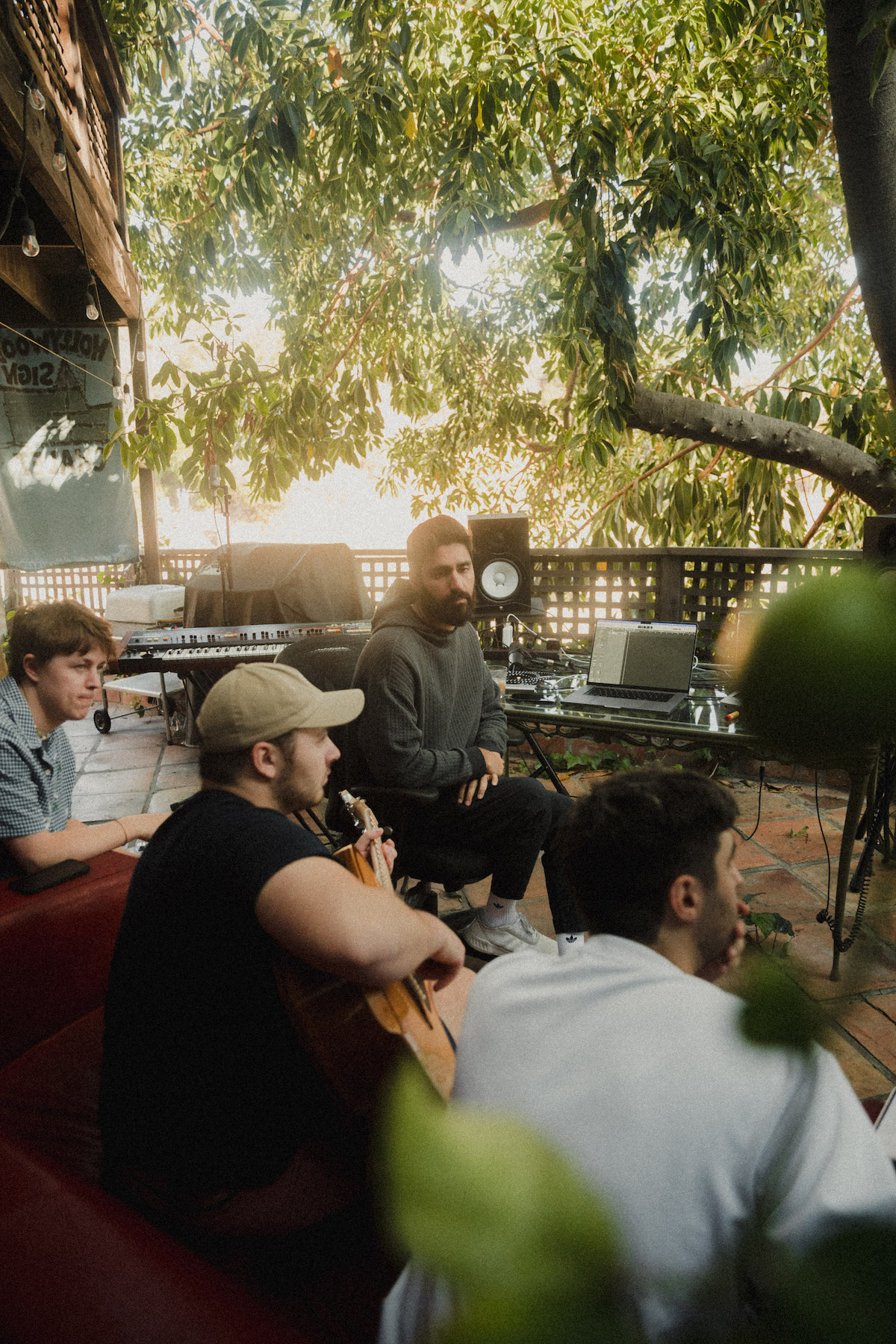
We already mentioned a few of my favorite tracks on the record, but “I Thought I Could Fly” stuck out for me right from the start. And I think that it's the vulnerability of those lyrics, with a very intimate performance. Can you share a little more about that song?
Rob Laska: That was a very last-minute addition. And that was a song that happened very quickly. It was like a one take that I recorded at my old place. Yeah, it was just a pretty intense kind of moment in my life. I think it was around holidays. I think just a lot of stuff was unfolding in front of me, in a way that I couldn’t necessarily handle at the time. I think the band was kind of just like deflated. I’m using that term now, just like everyone was just like… Which can get really dark for me. I’m the kind of person that, if we’re not filling my fulfillment bucket constantly, I get really scared up in my head because I love what we do so much. So sometimes, I get really obsessed with just constantly running.
I think that title kind of came from this idea of being a kid. You know when you’re a kid, you just run everywhere, and you would jump off what, at the time, seemed like the highest peak, because you just believe you can make the jump and you can believe you can fly over the slide or whatever. It came from this idea of, as a kid, I wasn’t scared of anything. I just thought I could do anything. And then you enter your mid 20s, late 20s, you become a semi-successful band and all of a sudden, now you have to fight for that fulfillment and that joy and that youth and that… You have to almost construct it, versus it just being there. I think that’s the toughest part about our lives right now, is like, even as a kid, I heard… I think Owen Wilson said this in a podcast recently, where it’s like, as a kid, you just go up to someone and start a conversation. You’re just not afraid of anything. But now, try doing that. I’m anxious as hell and I won’t do that. It’s just those little things, I think, that I was realizing I have to construct and fight for, and me not really handling it properly. I think when things get that squished, it doesn’t make me really wanna be anymore. So yeah, it’s just a sad number.
What would you say were the easiest and the hardest moments of making this album?
Mickey Brandolino: “Big Jet Plane” was really tough to figure out.
Alex Dimauro: That went through eight production phases.
Rob Laska: Literally.
Alex Dimauro: At one point, it was an acoustic song. At one point, it was like fun. meets Bleachers. At one point, we went really Train with it. It was wild, it was a wild adventure.
Rob Laska: Piano… [laughs] Also the “Either Way, I’m Going Your Way” vocals, they’re still not perfect…
Alex Dimauro: I think “Lost In Translation” was probably one of the easiest ones! “Malibu” was also easy.
Mickey Brandolino: “Lost In Translation” was effortless. A lot of them were, honestly quite a joy. I would say “Either Way” and “Big Jet Plane,” and “I Thought I Could Fly,” maybe from a mental health standpoint, were a low point. But most of them felt pretty effortless… “Break For You” was pretty easy, just kind of did itself. Also, we had a lot of friends working on that one. Everyone was given a little piece here and there, so it kind of just worked itself out.
The collaboration on this album, I think, also helped a lot. It was important for us to bring other people into the room, and the right people, because we’re not too much of an open door policy as we used to be. We used to be very like, “Anyone come write and do things.” Now, we’re a little more “protect our energy.”
Rob Laska: We protect our energy. We’re just too busy to say yes to everybody. But we have so many beautiful collaborators now that are friends that we bring in, and they just understand… They know how to build the Valley Legos. They just have played with the Legos for so long, they know exactly how to get what we want out of the room. So we feel really grateful with the collaborators on this album. I think that played a huge role in every song being such an easy, fun memory. ‘Cause the songwriting part is hard in terms of processing the emotions, but the actual export of it with people that you love around you, makes it really easy, which is nice.
Would you say that's a big change from the Valley that made MAYBE to the Valley of today, in that there's a lot more collaboration and it's a bigger family?
Rob Laska: Yeah. And still curated, a more curated family.
Mickey Brandolino: We collaborated a lot on MAYBE, honestly. There was a lot of people.
Rob Laska: Andy reined it in. But yeah, before Andy came as co-producer, we did so many different collaborations and sessions to get the songs. So yeah, it’s just a different… It’s the same, but different. We’ve always been open to people, collaborating, I think. But this album would not be the same without people. I think MAYBE, we were a little more less confident too. Some people might say, “Oh yeah, Lost in Translation is so different than MAYBE.” And I’m like, “Of course it is. It’s supposed to be. Why would we make that album again?” Truthfully, it’s just not gonna be it. Go talk to your friend that you’ve known for eight years and get mad at them that they’re not the same person. It’s been eight years. We did things. We’ve done things and I’m still here, but we’re living life. We’re doing our thing.
So I think that’s the most important thing that collaboration also does. If it’s with the right people around you that know you for who you are, they’re gonna express all those parts of MAYBE that we love, and all those parts of the EPs that we love. They’re gonna get that out of you. You’re always gonna have that. That’s where collaboration just breathes life, because they understand us from MAYBE to Lost in Translation. They get the whole thing.
You spoke so passionately about how the lyrics were a big focus for the band this time around. You really wanted those to be a highlight and you put a lot of effort into them. Can you all share some of your favorite lyrics that resonate with you?
Rob Laska: There’s probably so many. “Fishbowl,” for sure, I love all the lyrics on that song. They’re very reminiscent of just vague storytelling that I get obsessed with. I get obsessed with the kind of lyric writing that’s painting a picture, and you can build your own narration. “Lost in Translation,” I’m really proud of, ’cause it’s just kind of a word vomit of like a tour diary entry, in a way. That’s what it feels like. There’s so many, guys.
Even a song like “Break For You,” “Have A Good Summer”… It’s so poetic, but oddly on the nose, which we get obsessed over. And yeah, a song like “Break For You” too, where it’s the arc of the lyric and the melody that make it feel so here, because the line isn’t revolutionary. It’s, “I’ll break, I’ll break, I’ll Break For You.” But I think the way it’s delivered and how much that opens up in someone’s mind of what that could be, I think is the true beauty of it. And yeah, there’s two different obsessions with this album too, ’cause it’s like the lyric writing and giving people that Lost in Translation diary entry, and it’s also giving people a meticulous melody that we’ve structured, that just makes us flow, like a “Break For You” melody or a “Natural,” where it’s just like, that’s our brains getting so obsessed with the emotional math that songwriting is. ‘Cause I never want to deny that songwriting is, A, a… It’s a spiritual God thing as well. Like, songs just kind of also come to you, and that’s like one piece, but it’s also this other beautiful piece of like, you’ve done it forever and it’s an emotional format that you learn to play with and use. And songs like “Break For You” and “Natural” are us digging into that as well.
It’s really fun to structure and feel melodies and really care about the little antics of every word and phrasing, stuff like that. So yeah, so many different lyrics for different reasons. But I guess those are the songs I would highlight. I don’t know, Mike, what do you think?
Mickey Brandolino: I really love really honest and emotional lyrics that are also clever. The chorus of “Big Jet Plane” is just really wordplay, but also a direct kind of representation of, sometimes, one angle of how it feels to be on tour sometimes. And it’s like, “Life gets lonely on a Big Jet Plane, heart feels hollow with a big suitcase.” It’s these big, bombastic, amazing, cool things, and if you’re not set up properly or you have a low moment, obviously just the human condition of being away from loved ones or just being exhausted from traveling, or whatever it is… I like the wordplay of that, but also how it really truly came from an honest experience. We toured a lot the last two years – a lot. It’s been the best times of our lives, and yet the reality of traveling a lot is, sometimes, it’s tough. So I thought they were cool lyrics.
You have toured almost nonstop over the years. What are some of your biggest takeaways and lessons you've been able to take back with you to the stage and the studio?
Mickey Brandolino: We think about the live show a lot when we’re in the studio more and more. Like the breakdown in “Break For You” where the drums come out, everything really comes out except for the guitars and Rob’s screaming, like this huge yell. And it’s like, even though all of the instruments drop out, it gets way more epic somehow. And we knew that because live, it’s gonna be this huge release when the fans have a moment to scream and then can come back into the last chorus, and someone’s gonna jump off something, and… You know what I mean? We think about that moment in the studio now that we’ve toured so much. We’re like, “This is a live moment, this is the lyric that everyone’s gonna scream in the crowd,” or like this… Literally adjusting a lyric to be more scream-able as an audience member, to feel that connection. I think musically, we’ve definitely just become more attuned to that.
Rob Laska: 100%, I agree. The live show is so important, and I think, yeah, more and more now, I think going to the studio, that’s a big… I guess, yeah, that was maybe one other musical sonic thing that you were talking about. I guess we did think about the live show quite a bit. I’m just happy we get to tour and we have the privilege to tour, ’cause now we’re living in a world where it’s kind of split. When we were coming up, playing shows was the thing. It just always has been. It’s like you go play shows, you build your audience. And I still think it’s really important, and we’re always gonna preach, “As soon as you can tour, go tour.” Because there’s still an element of not skipping steps. And those people that show up to those first few shows at 100 cap venue are gonna bring 100 people, and you’re gonna build your touring career in a way that you’re gonna have a career for the rest of your life. And at the end of the day, what more could you ask for? The fact that you can grow old and still have people show up and see your show, because they’ve been connected with you for that long. So, yeah.
I’m just always grateful and practicing the gratitude of touring, ’cause touring’s really hard but it’s also such a privilege and it fuels our career in such a way that the internet can’t always do. TikTok and Spotify and all this stuff… Like I said, we’re kind of living in an age where there’s a lot of artists that are just like, “I’m just a Spotify artist. That’s my thing. And I’ll just do the internet, and that’s gonna be my career. I’m not gonna tour.” I’m not even getting frustrated at it, it’s more so like, “But you’re missing out on such a beautiful part of your career. You’re missing out on literally being in a room and hearing the people screaming your songs in front of you.”
It’s incredible. Like, why wouldn’t you wanna do that anyways, regardless if it’s important to building your career? So I think it’s just gratitude and empathizing that we can even do it, ’cause we know it just costs a lot of money to tour and travel and stuff, and this album has luckily gotten us to a point where we can do that and be successful at it. So I’m just always thankful we can do it, ’cause I understand how much of a privilege it is. But if anyone’s listening, any artist, if you can tour, go tour. It’s so worth it. You’re gonna see… It just does a lot. It really does a lot, and it’s a beautiful experience. It’s something you’re gonna regret not doing more.
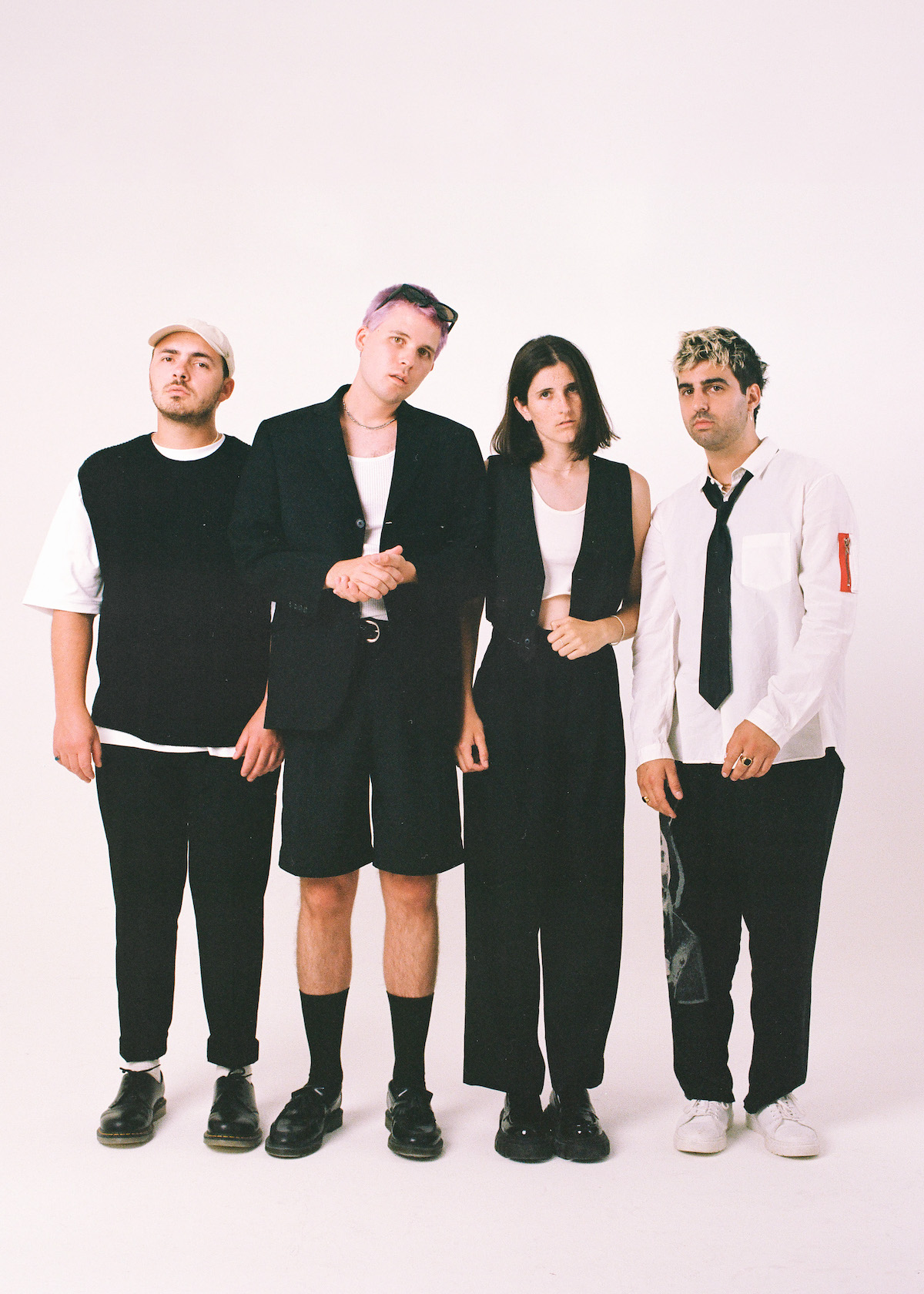
Not to mention, what is the point of doing music, if not for community? And if you're going to perform in any capacity, it's always better to do it with friends.
Rob Laska: 100%. I think that’s maybe why we collaborate so much in the studio too, because we miss having people around. We’re so used to playing in front of 1000, 2000 people, it’s nice to also have some people in the room when we’re making music too ’cause it feels like we’re also doing that back and forth with an audience in the sense of, writers are kind of friends and also kind of an audience for you to throw your emotions at and be like, “This is how I feel. Help me make it make sense.” So, yeah.
What have you taken away from making and putting out Lost in Translation, and what do you hope others take away, listeners take away from the album now that it's out?
Rob Laska: So many things. I personally have taken away a lot of just kindness and I think more respect for my band mates, for my friends. I think I’m just like, this album introduced me to a whole new level of… I think, of skill and kindness and empathy and gratitude from all of us. I think we realized with this album, the weight that we carry and I think how much influence we actually do have on each other and our fans and stuff. I think it’s really healthy for us to always be imagining where this little tiny baby band, which we are… On a grand scheme, we’re a tiny, little baby band. But there are parts of me in touring the world and seeing the music enter people’s lives, that’s like, “Oh, we’re a tiny little baby band, but with a little bit of give here.”
We do have an influence on people, and it makes me realize that we need to respect that a lot. And the kindness and respect that we’ve learned to have with that, I think has been a big eye-opener for me. It’s like, we’ve learned to really value this thing at what it’s supposed to be valued at, ’cause us being Canadian as well and stuff, we’re very much like, “Ugh. No, we suck. No, we’re not that good.” You’re kind of living in that fear of never being good enough. But I think I’ve learned one takeaway is just to own who we are and respect the people, and kind of the love we’ve been shown, ’cause it’s not a given these days.
Alex Dimauro: To add to that, expect the unexpected, because I feel like, on so many different facets of what the album has done, I feel like the songs are always gonna mean something different to other people than they meant to you, and the songs also might mean something different to you later than they did when you were writing and producing them, you know? That’s one thing I kind of learned. ‘Cause I listen back now and I’m like, “Wow. This is crazy.” When we were writing this song, I didn’t even think of this thing or how it relates to this aspect of life or whatever. It’s wild.
Rob Laska: Yeah, an open mind, it’s so true. I agree with that. That’s a big, big point. I think we’ve learned to not define as one feeling for what it might be later. I feel like I’m going through that right now. Mike wrote this song on a writing trip a few months ago, and when I first heard it, I was like, “Ah, it’s a song.” And then now I’m like, “Oh, I’ve fallen in love with it.” I love it because I think I heard it in a different way, and I think I just heard a potential existence of it where we’re doing it and it’s sick. And I’m like, “Oh, now I’m obsessed with it.” No feeling is permanent. That’s a good point, Alex. You grow so much making an album. You’re gonna hate one thing one day and love it the next day. It’s just how it goes.
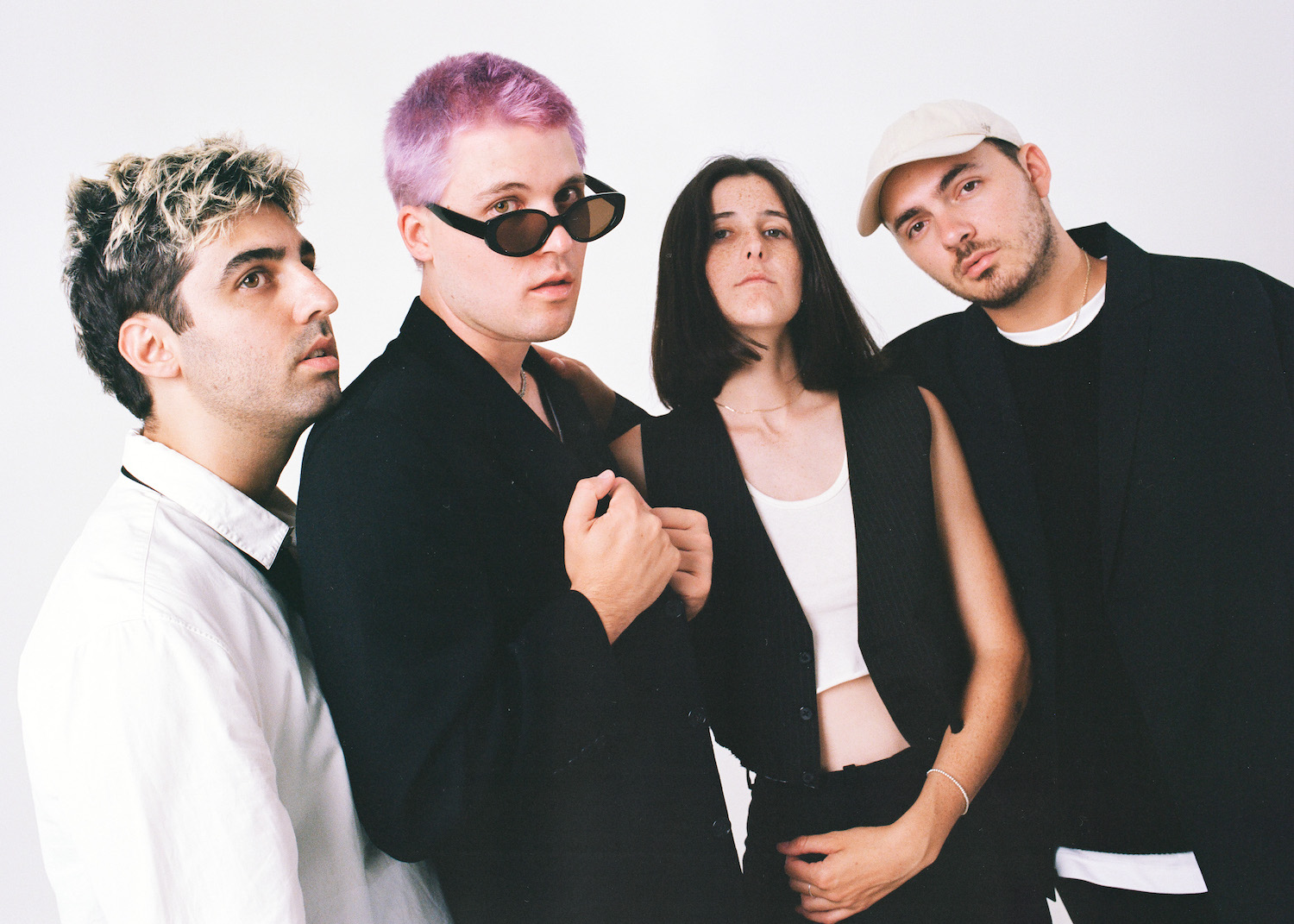
In the spirit of paying it forward, who are you listening to these days that you'd recommend to our readers?
Alex Dimauro: I’m listening to Fred Again lately.
Rob Laska: Fred Again has been taking the world by storm. I love him so much. I’ve been listening to some Harry Nilsson. This is old school, but some good cowboy folk music. It’s really good. I’ve been listening to, yeah, Fred Again. I love the new Jon Batiste album, it’s incredible. It’s called World Music Radio. I think he’s a genius.
Alex Dimauro: I really like the new Sadie Jean song, “16.”
Mickey Brandolino: Oh, “16.”
Rob Laska: That song is so good.
Mickey Brandolino: Oh, and the new Grace Enger record!
Rob Laska: Oh yeah, Grace Enger is the goat. Actually, please check out Grace Enger. She’s, I think, very underrated. I feel like she just started her artist project, but you should interview her. Grace Enger is awesome. I think she’s just a great, great writer.
Mickey Brandolino: You’ll love her record.
Rob Laska: She also just has a lot of funny shit to say. I feel like you’ll have a good conversation with her. Also Holly Humberstone, the new Dominic Fike album, the new Japanese House album, I think is stunning.
Alex Dimauro: The new Miley Cyrus tune?
Mickey Brandolino: Yeah, new Miley Cyrus. “Used To Be Young.” It’s so good. It gave me “The Climb” vibes, but kind of minor climb.
Rob Laska: It’s like a short climb.
Mickey Brandolino: “The hike.” [laughs]
Rob Laska: It’s a great hook. I love that line, so heartbreaking, where it’s like, “Used to be crazy, used to be fun. And then I said, well, I used to be young.” I’m at the point where I stay up. I’m that guy where I’ll stay up ‘til midnight so I can put headphones in, in bed, and just check out all the new music. I’ve just kind of become that guy. It’s like doing your homework as a songwriter or producer. I think Pharrell said that. It’s like, do your f’ing homework. So literally sit in bed and listen to what’s new for like an hour or two, because I wanna know what’s up and what’s going on with releases and stuff, ’cause that’s usually where the inspiration kicks. You hear that one song and you’re like, “Okay, this is the bar now. Let’s go.”
— —
:: stream/purchase songs that got lost in translation here ::
:: connect with Valley here ::
— — — —

Connect to Valley on
Facebook, Twitter, TikTok, Instagram
Discover new music on Atwood Magazine
© Becca Hamel
:: Stream Valley ::

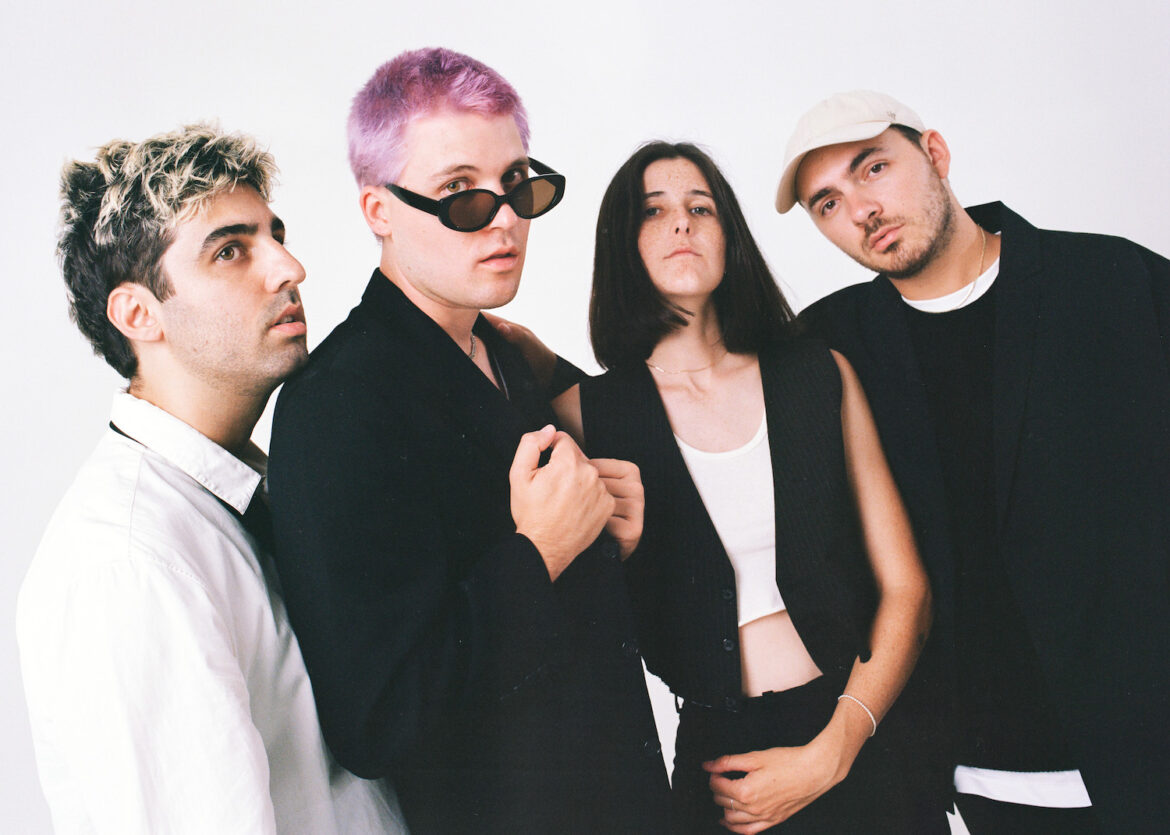
 © Becca Hamel
© Becca Hamel